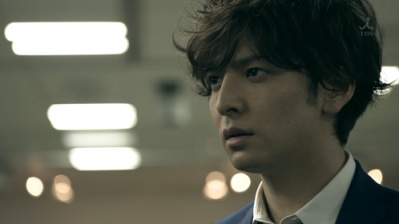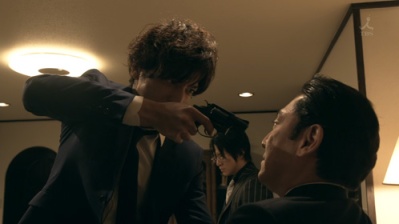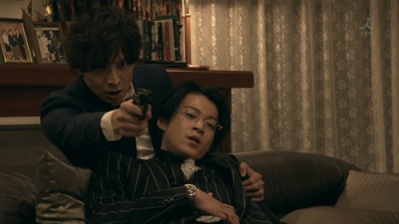Recurring fate you’re still haunting me
no one believes no one will know
Recurring fate
you’re still whispering
no one believes no one no one can tell
Two boys who grew up at an orphanage found their favourite teacher Yuiko murdered one night and the incident covered up by a policeman wearing a gold watch. The boys vowed to avenge their teacher. Twenty years later, Ryuzaki Ikuo (Ikuta Toma) is a detective in the Shinjuku second police bureau investigating cases with Hibino Mizuki (Ueno Juri), while Danno Tatsuya (Oguri Shun) has become one of the leading members of the yakuza. As Ikuo and Tatsuya gain ground on uncovering the murderer’s identity, Mizuki begins to suspect the relationship between the two men…
The ouroboros (Greek: οὐροβόρος ὄφις – tail-devouring snake) is an ancient, mystical symbol of the snake biting, devouring or eating its own tail. It is the symbol of many broad concepts such as the eternal cycle of life and infinity, creation out of destruction, self-sufficiency of nature, completion, and also in the sense of something constantly re-creating itself. It can also be depicted in a lemniscate shape, with the snake looped once before eating its own tail. The ouroboros is featured in both mythology and alchemy, and was first seen as early as 1600 BC in Ancient Egypt as the symbol of the sun. It then moved on to the Phoenicians and later the Greeks, who gave it its name.
Yuiko’s necklace features as the base symbolism for the drama – the ouroboros pendant is of two dragons looped into a figure 8 and eating their respective tails (Tatsuya’s back also has such a tattoo design). The two dragons are naturally Ikuo and Tatsuya, on the surface complete opposites but actually complementary both personally and professionally. Already in the characterisation one could see several concepts of the ouroboros play out – Ikuo is the ace of the Shinjuku second police bureau, and his high arrest rate is courtesy of Tatsuya, who feeds him inside information. Despite his bumbling exterior, Ikuo can be just as no-nonsense and decisive as Tatsuya, and will not hesitate in getting the job done when necessary. Tatsuya himself adopts several personas, in part to hide his true self and also to facilitate his search for Yuiko’s killer. His constant reinvention of self is borne out of necessity given his position in the yakuza, and also due to his own self-preservation instincts that must have been honed from young. Both have similar backgrounds of having been abandoned by parents, although Ikuo’s is far more destructive and illustrates better the concepts of karma, retribution and coming full circle.
With a rich set-up like this, Ouroboros got off to a quick and absorbing start but cracks in execution began showing soon after. Even though Ikuo was the main character, it was Tatsuya who got my attention off the bat and I was disappointed the drama wasn’t able to make him a more layered character (despite Oguri Shun’s best efforts). I was pretty disappointed he was so singularly one-track and that the reason he was so determined to nail Yuiko’s killer was because she treated him like family and he (possibly) harboured a one-sided crush on her. I wanted Tatsuya to do more, to know more of his politics in the yakuza world, to see more grey and complexity in his character. And much more could have been done with Ikuo, but except for the occasional cracks in façade, there was little in Ikuo that made him interesting beyond the revenge quest – Ikuta Toma was serviceable but was rather overshadowed by Oguri throughout. Once it was known that Ikuo’s real father was the mastermind (“kintokei gumi” is kinda silly, and dad suddenly confessing to Ikuo made little sense), I had thought patricide would be involved and indeed the drama toyed with that possibility by having Ikuo so angry he was ready to shoot the man. Unfortunately, it was akin to a stranger shooting another stranger because the drama had no time to build up the father-son relationship and explore in depth Ikuo’s psyche and reaction.
Also, some scenes were plain silly. Despite the obvious difference in professional status, which means they should ideally never be seen together in public, Ikuo and Tatsuya could be found talking to each other (albeit not face to face) every so often. They weren’t subtle about it either – high-profile meetings in some high-class hotel bar frequented only by foreigners (c’mon now…) or on opposite sides of a wall in the middle of a busy street, just to name a couple of choice locations. If the police weren’t so inept in general, Ikuo and Tatsuya would have been found out already. And no matter how “intellectual” a yakuza he was, Tatsuya was not particularly smart in his disguise when he and Ikuo went to see the Haijima company boss – I’m pretty sure that half-baked attempt at snooping was just so Oguri Shun could do a double kabedon in a cop uniform. I also disliked the drama’s decision to make use of the constantly smirking detective Chono to tell rather than show – police officers who think too highly of themselves are a dime a dozen in any cop procedural, but Chono just about takes the cake with his know-it-all smirks and obsession with taking Tatsuya down. Instead of having Chono bore the audience with what he thinks Ikuo’s real nature is (“they’re the eyes of a criminal”), the drama could have spent the time to better shape Ikuo and Tatsuya.
I liked the twist about the children being primed for organ trade, but wished the drama had gone a bit further with the concept and made it more sinister – in fact, it would have been pretty neat had Yuiko been complicit to the extent that her love for the children was merely part of her job and not genuine. Ayano Go’s late entry was a nice surprise but I wish he’d done more sleuthing with the boys. There were loopholes aplenty – just how, for example, did Mishima find out where Tatsuya was hiding, when there was no previous sign he’d been tracking Tatsuya the way Chono was? – and an abundance of useless police characters. I would even venture to say that screentime for Mizuki should have been cut down – ultimately, her role was not key to the revenge quest and she contributed little to the overall scheme of things. It was interesting to see how she tried coming to terms with Ikuo’s duality and her own acceptance of her father’s role in the Mahoroba incident, but since dad was never the villain to begin with, Mizuki’s role lost steam. The drama didn’t attempt to play up the love line, which was just as well since I did not think Ikuta had much chemistry with Ueno Juri. However, more interaction between Tatsuya and Mizuki might have helped her role – for one, the actors had far more chemistry in their handful of scenes and it was a more intriguing clash of characters and values.
Also, the overdose of flashbacks got annoying even before the drama reached the halfway mark. It wasn’t necessary to start every episode with a reminder that the guys were hunting down Yuiko’s murderer since the whole drama was about it. The length of each flashback and the amount of detail it went into got pretty painful – the drama really did not need that many flashbacks to establish just how important Yuiko was to the guys, or to get Ikuo to remember the events of 20 years ago. The flashbacks should have been more compact and used only when necessary to heighten impact, but they ended up feeling like an obligatory, tedious walk down memory lane because Ikuo could not for the life of him remember the all-important details. Making him a little smarter in this regard would have cut down on the remembering and allowed more time to explore the various themes of the ouroboros set-up.
With the drama so steeped in the ouroboros symbolism (and shoving it in the viewer’s face every episode), the ending is thus not a surprise given how events have played out over the course of the 10 episodes. I wasn’t expecting Ikuo to commit suicide, however, because I didn’t see why he had to do that (also, I didn’t understand why nobody thought to rush Tatsuya to a hospital, but I guess that would kill the big emotional moment where he realised it was all for naught). I do get the sense of despair, the coming full circle because he’d never be able to exact his revenge on the man who sired him, the desolation because Tatsuya died, but I didn’t feel he was driven into a corner such that there was absolutely no way out but death. Perhaps this was due to the writing, or the inability of the actor, but I did not get why Ikuo had to die. Tatsuya had tried to spare him from the ugly final confrontation, and even Mizuki had given him an out, but not taking either of the options perhaps also showed his inability to look at the big picture and realise the futility of revenge. That’s a bit of beef I generally have with dramas and characters like these, that they can never realise that they have a choice to live on and make things work. I always give props to dramas which have the guts to kill off their protagonists, but this shouldn’t be done just for the shock or WTF factor, or even taking the easy way out. I think it says much for the drama that Mizuki’s sobbing scene and Fukamachi eating the omurice in memory of Tatsuya at the end were more gut-wrenching than Tatsuya and Ikuo’s deaths. And the “reunion” with Yuiko at the end was just silly, I wish the drama hadn’t given in to the sappiness of the whole thing, but I suppose it’s minor consolation that it’s nowhere near the fuckery that was Kyou wa Kaisha Yasumimasu‘s ending.
Acting-wise, Oguri Shun was the standout of the three, managing to give Tatsuya layers where there were virtually none. I like that he lowered his voice so he came across as cooler and more mysterious, and the styling for Tatsuya hit any number of right notes. As I was watching Nobunaga Concerto at around the same time, it gave me the chance to better appreciate Oguri’s versatility and I really wish the drama had developed Tatsuya properly, it’d have made an already interesting character more compelling. Ueno Juri was fine, though she didn’t really feel like a police detective and her hairstyle reminded me too much of Nodame. For a drama that was male-centric, she had a substantial secondary role and I did enjoy seeing her mixing around with the boys. This was my first time seeing Ikuta Toma act and while he did all right, this was a pretty safe role and there was nothing breakthrough-worthy from him (he was, however, in dire need of a wardrobe and hairstyle change). Had the writing been bolder, all three actors could certainly have done more with their roles, but that unfortunately was not the case. The poppy theme song by Arashi was ill-fitting and should never have been used – the sub-theme No One by Kimura Hideakira and ENA (lyrics at the top of this post) matched the overall mood of the drama better.
Ultimately, Ouroboros was just your average eye-candy take on the cop procedural, with the occasional flashes of what could have been. It was a decent ride while it lasted, but given the potential it had, the end product is disappointing.
junny@11.14pm












OMG was this what happened?! I watched the first two eps but somehow could not come back to the show. But I agree with you about Oguri vs Toma (and I love them both) – Oguri definitely won and overshadowed the latter. Thanks for reviewing this!! Now I know I need not finish this show :p
LikeLike
Yeah, they both died – well, it was implied for Ikuo, but more or less confirmed by Mizuki sobbing her heart out at the end. She also ended up wearing his ouroboros necklace. Anyway yeah, this is pretty average so it’s not a huge loss if you skip it.
LikeLike